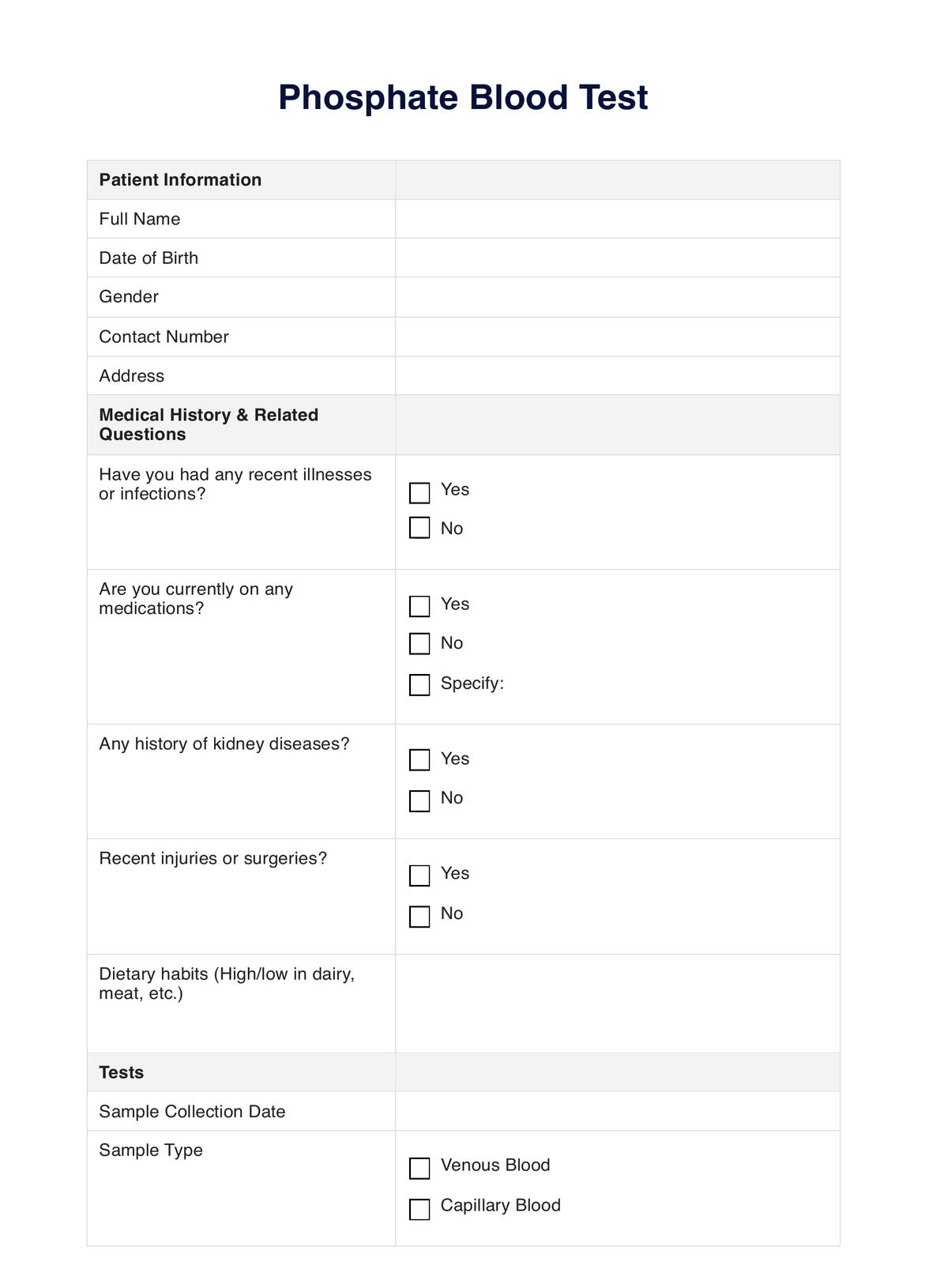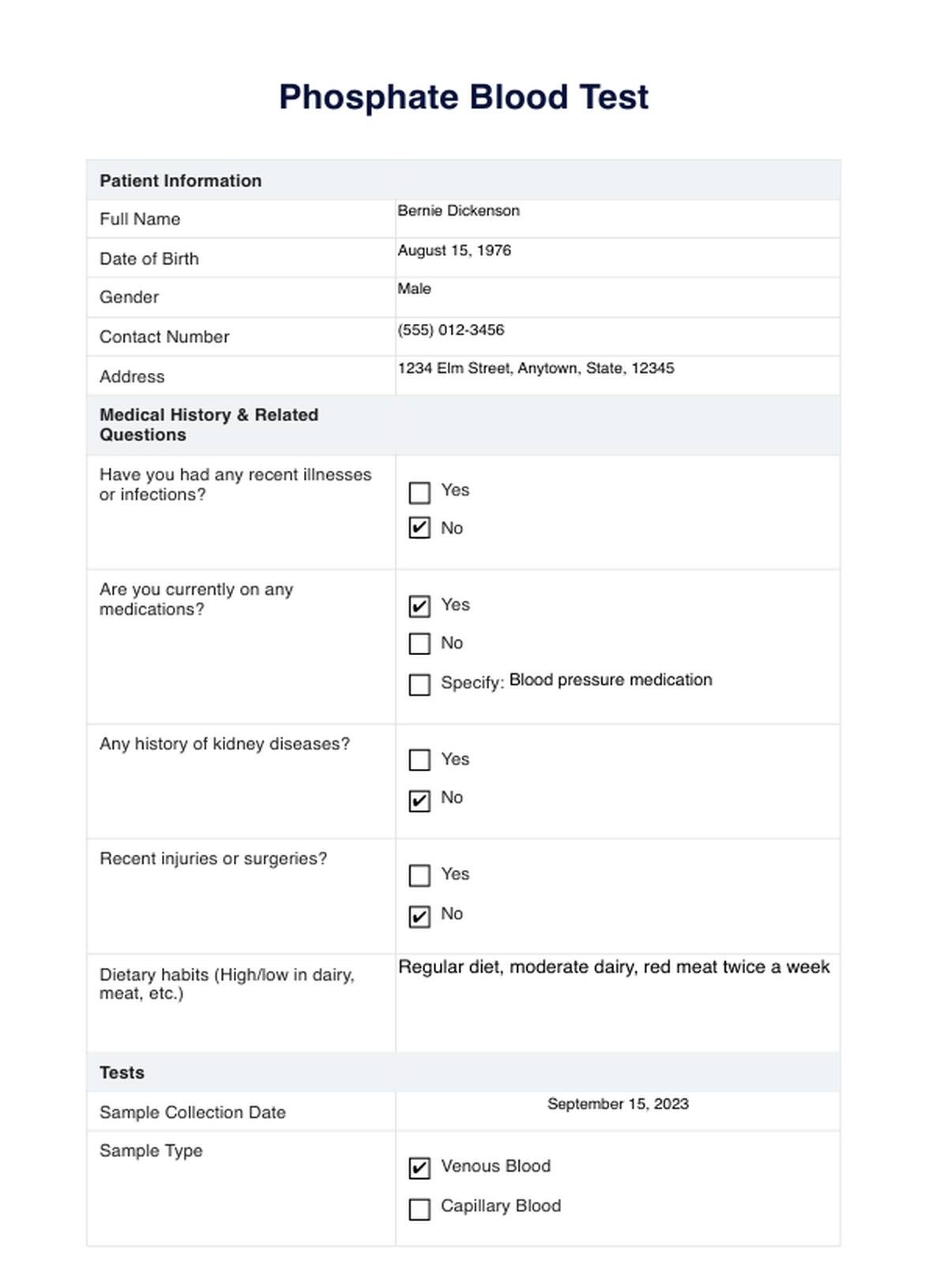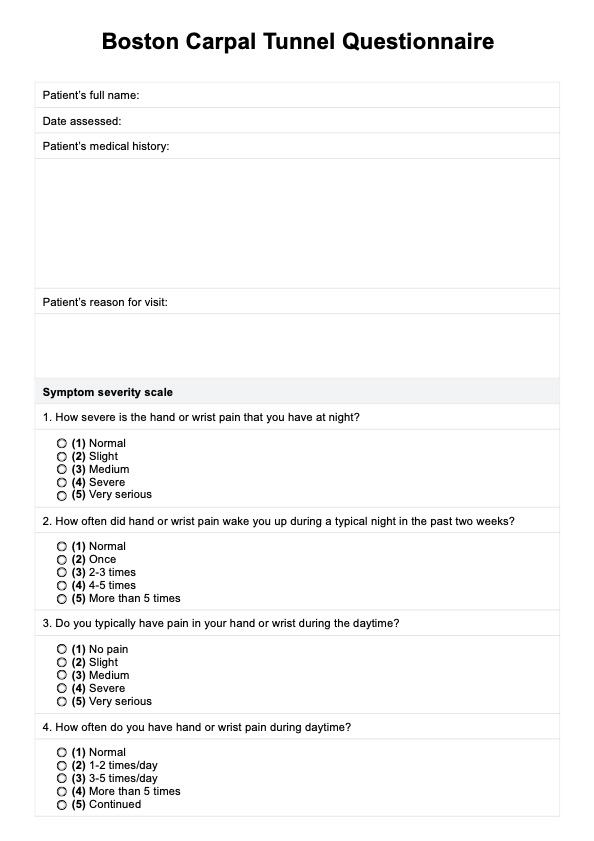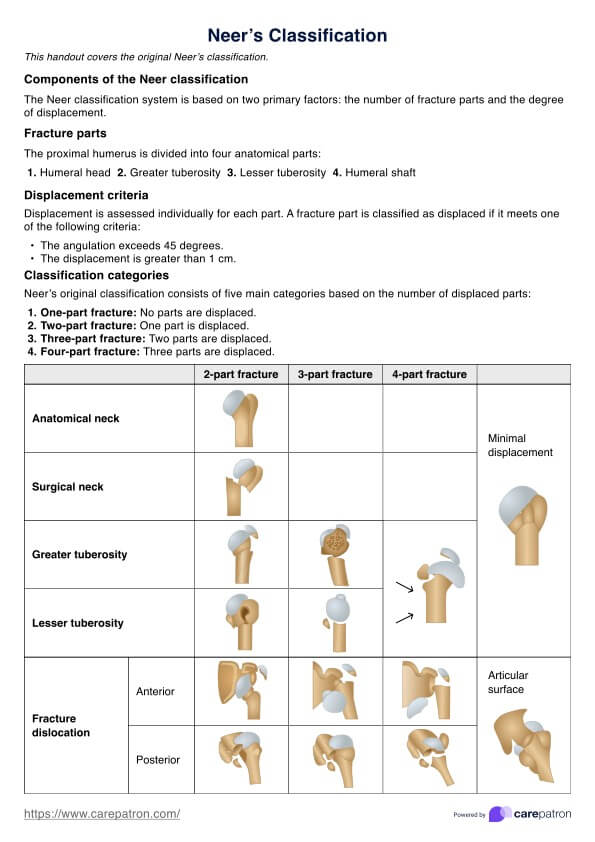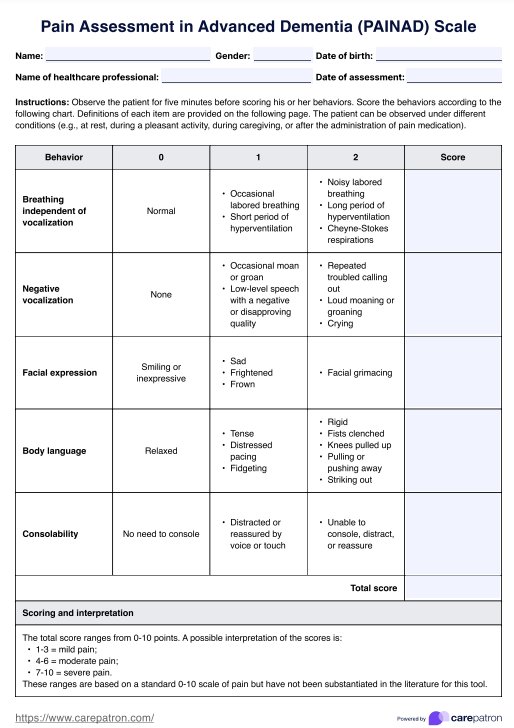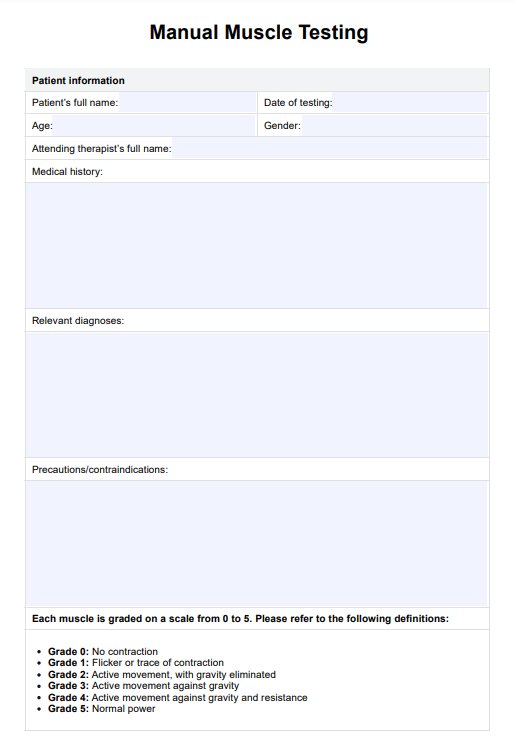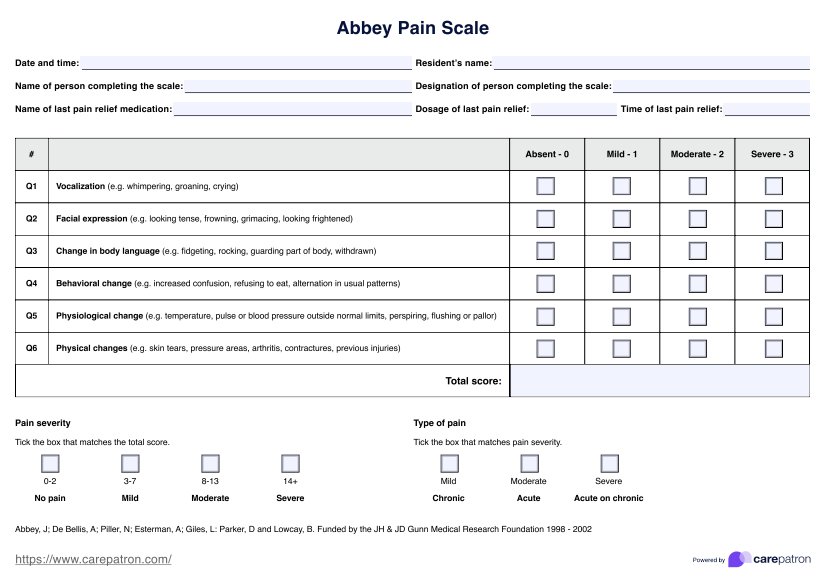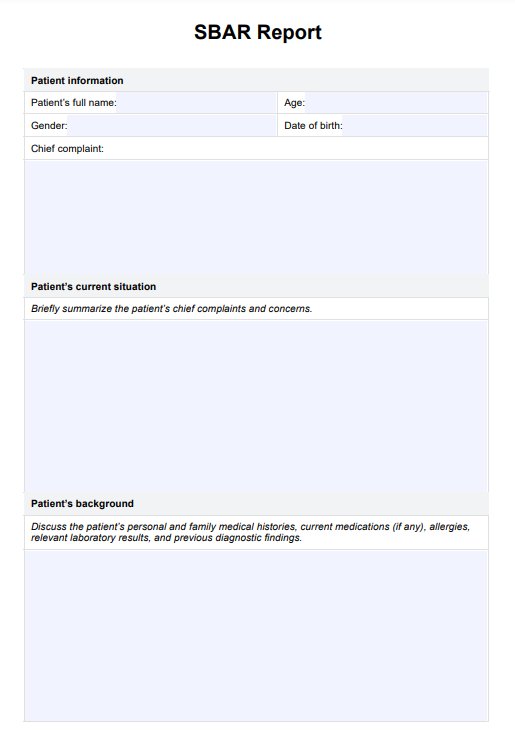Phosphate Blood
Discover Carepatron, your next-gen phosphate blood level monitoring solution. Seamless, secure, and smart healthcare at your fingertips!


What is a Phosphate Blood Test?
Navigating the intricate pathways of patient health often requires a deep dive into the biochemical realm. One such critical parameter within this space is the concentration of phosphate in the blood, typically assessed through a Phosphate Blood Test. This essential test is more than a mere measurement; it's a health compass, guiding medical professionals through the complexities of metabolic balance, bone health, and vital cellular functions.
Phosphates are minerals in your body that help with energy production, muscle function, and nerve signaling, playing a pivotal role in bone strength. However, like any aspect of our internal biochemistry, balance is critical. Too much or too little phosphate can signal issues ranging from kidney dysfunction to malnutrition, making the phosphate blood test a crucial tool in a healthcare professional's diagnostic arsenal.
The test is straightforward but requires the precision that healthcare professionals pride themselves on. A small blood sample can reveal the phosphate levels, offering insights that could navigate patient care toward early intervention, effective treatment, and comprehensive management plans. It's not just about numbers on a lab report; it's about understanding the stories those numbers tell about our bodies, health, and lives.
In a world where healthcare is becoming more advanced and patient-centric, tools like the phosphate blood test become the silent narrators of a patient's health story. They are the unsung heroes in preventive medicine, the harbingers of necessary change in treatment protocols, and the markers of progress or recovery.
With resources like Carepatron, these tests are seamlessly integrated into a patient's health journey, ensuring no stone is left unturned in pursuing holistic well-being.
Phosphate Blood Test Template
Phosphate Blood Test Example
How to use the Phosphate Blood Test
Conducting a Phosphate Blood Test requires precision and adherence to medical protocols to ensure accurate results. This guide provides a step-by-step approach to performing this test efficiently and effectively.
1. Prepare the Patient
Explain the procedure, its purpose, and any preparatory steps (such as fasting) the patient may need.Check the patient's medical records for conditions or medications affecting phosphate levels.
2. Sample Collection
Assemble all necessary materials, including needles, tubes, and personal protective equipment.Use aseptic techniques to prevent contamination. Then, draw a blood sample from the patient's vein, typically from the inside of the elbow or the back of the hand.
3. Processing and Analysis
Ensure the sample is correctly labeled with the patient's information and stored under appropriate conditions during transportation to the lab.Utilize standard medical equipment to measure the phosphate levels in the blood sample.
4. Interpretation of Results
Compare the results against the standard phosphate range, considering any factors influencing phosphate levels. Record any relevant observations or irregularities noted during the process.
5. Patient Consultation
Provide a comprehensive explanation of the test results, what they signify, and any necessary follow-up actions or treatments.
The Phosphate Blood Test is critical in monitoring and diagnosing various health conditions. It demands a meticulous approach, from preparation to consultation, to ensure the patient receives accurate and informative results.
When Would You Use This Form?
Understanding when to utilize the Phosphate Blood Test is crucial for healthcare practitioners, as it ensures appropriate and timely intervention. This test is a routine procedure and a targeted tool for specific medical purposes.
- Monitoring Electrolyte Levels: Ideal for patients with conditions that could disrupt their body's balance of minerals and electrolytes, necessitating regular checks to prevent complications.
- Kidney Function Assessment: This is essential for individuals with known or suspected kidney disorders, as phosphate levels indicate kidney health.
- Evaluating Malnutrition Risks: Useful in scenarios where malabsorption or malnutrition is a concern, providing vital information on the body's nutrient status.
- Bone Health Concerns: Recommended for patients with symptoms of bone disorders, as phosphate is crucial for bone formation.
- Pre-surgical Screening: Often required before major surgeries to ensure there are no underlying electrolyte imbalances that could complicate surgical outcomes.
- Medication Impact Assessment: Necessary for those on certain medications known to affect mineral levels, ensuring that therapy is not leading to adverse side effects.
The Phosphate Blood Test is an invaluable resource in various medical specialties and is instrumental in diagnostic and preventive healthcare. Its versatility makes it a staple in patient health monitoring, contributing significantly to comprehensive patient care.
What do the Results Mean?
Interpreting the results of a Phosphate Blood Test involves more than just comparing numbers against a standard range. It requires understanding what these figures signify in the broader context of a patient's health.
Phosphate levels in the blood can fluctuate due to several factors, and specific readings might indicate different conditions:
- High Phosphate Levels: Often associated with kidney dysfunction, as kidneys are responsible for regulating phosphate. Other conditions, such as hypoparathyroidism or an overconsumption of phosphate, can also lead to elevated levels.
- Low Phosphate Levels: Typically a sign of malnutrition or malabsorption, where the body isn't receiving or processing enough nutrients. Certain disorders like hyperparathyroidism or specific medications could lead to decreased phosphate levels.
When interpreting results, it's essential to consider the patient's overall health, medical history, and concurrent conditions. For instance, a malnourished patient with low phosphate levels may require a different approach than one with a similar reading due to hyperparathyroidism.
Research & Evidence
The Phosphate Blood Test has been the subject of extensive research, solidifying its credibility and essential role in healthcare. The test's significance lies in routine health assessments and profound clinical scenarios, providing critical insights into patient management.
One groundbreaking study highlighted an in-vitro abnormality in glutathione metabolism within erythrocytes from normal newborns, emphasizing the clinical significance of these findings in newborns' health status (Zinkham, 1959). The research provided early insights into the metabolic processes and potential irregularities that could be detected through meticulous blood testing, even in the absence of overt symptoms.
In modern pandemics, research has also underscored the relevance of blood tests in managing global health crises. A study on COVID-19 patients revealed a high prevalence of anemia, influencing the patients' overall survival rates. This research suggested that while anemia did not directly influence mortality, it commonly affected elderly, frail patients, potentially impacting their quality of life (Bergamaschi et al., 2021).
Furthermore, the evolution of technology has led to advancements in blood testing methodologies. A recent study introduced a cell-free DNA (cfDNA) targeted methylation-based sequencing approach for multi-cancer early detection. The research emphasized that cancer detection via this advanced blood test was prognostic beyond the clinical stage and diagnosis method, linking cancer detection and prognosis to the biological factor of tumor fraction in cfDNA (Chen et al., 2021).
References
- Zinkham, W. (1959). An in-vitro abnormality of glutathione metabolism in erythrocytes from normal newborns: mechanism and clinical significance. Pediatrics, 23(1), 18. DOI: 10.1542/peds.23.1.18
- Bergamaschi, G., Borrelli de Andreis, F., Aronico, N., Lenti, M., Barteselli, C., Merli, S., ... & Di Sabatino, A. (2021). Anemia in patients with Covid-19: pathogenesis and clinical significance. Clinical Chemistry and Laboratory Medicine, 59(1), 79-88. DOI: 10.1007/s10238-020-00679-4
- Chen, X., Dong, Z., Hubbell, E., Kurtzman, K., Oxnard, G., Venn, O., ... & Liu, M. C. (2021). Prognostic Significance of Blood-Based Multi-cancer Detection in Plasma Cell-Free DNA. Clinical Cancer Research, 27(15), 4221-4231. DOI: 10.1158/1078-0432.CCR-21-0417
Commonly asked questions
The Carepatron app offers comprehensive tracking, easy access to patient history, and the ability to share information directly with patients, making it ideal for monitoring biochemical markers like phosphate levels.
Absolutely, Carepatron stores all patient data, including past test results, which can be accessed anytime for comparison and progress tracking.
Yes, Carepatron prioritizes data security, ensuring all patient information is encrypted and stored following strict privacy regulations.


